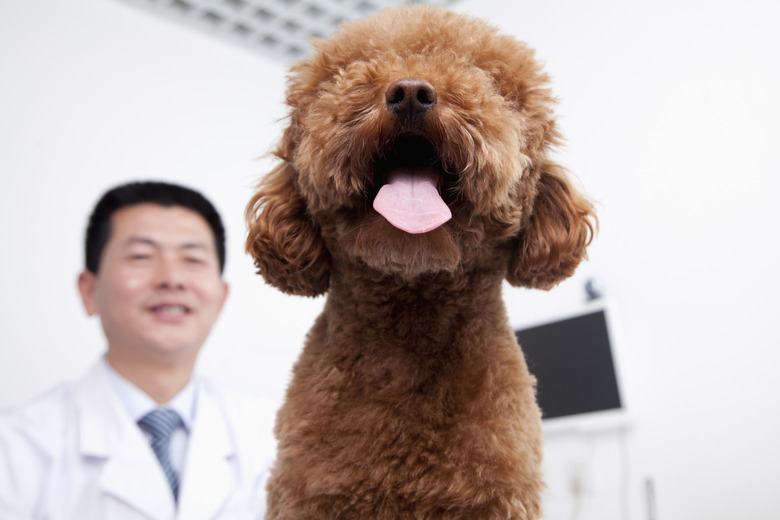Side Effects Of Vetalog
Triamcinolone acetonide, marketed under the brand names Vetalog and Panalog, is a powerful anti-inflammatory. Although effective, Vetalog has numerous side effects, and many dogs with pre-existing health conditions should not receive this medication. If your dog experiences any side effects after Vetalog administration, call your vet as soon as possible.
Triamcinolone Acetonide
Triamcinolone Acetonide
A synthetic glucocorticoid, triamcinolone acetonide generally is administered in injectable form, although a topical eye ointment is available for animals requiring an ocular anti-inflammatory. The drug also comes in a tablet form. Your vet might prescribe Vetalog for canine arthritis, skin conditions or allergies. For many of these ailments, your vet most likely will give your dog an shot of Vetalog to provide rapid relief. One injection can ease discomfort in your pet for a week or two, often enough time for a skin lesion to heal. That's also a downside if your pet experiences side effects. Because of Vetalog's long duration in the system, these effects can last for quite some time, unlike the side effects of short-term medication.
Allergic Reactions
Allergic Reactions
Some dogs experience allergic reactions when given Vetalog. Signs of an allergic reaction include a breakout of hives or breathing difficulties. As with any injection, there is always a risk of an anaphylactic shock. If your dog exhibits any signs of an allergic reaction or collapses, get him to an emergency veterinary hospital immediately. Anaphylactic shock is a life-threatening condition.
Side Effects
Side Effects
As is common with steroid medications, dogs receiving Vetalog may increase water consumption and urinary output. Other side effects include vomiting, increased appetite, weight gain, lethargy and panting. Long-term use can cause Cushing's disease. Symptoms of Cushing's disease, or hyperadrenocorticism, include hair loss, diarrhea, muscle wasting, chronic skin infections and skin thinning. The drug also can result in diabetes when used for a long period.
Precautions and Contraindications
Precautions and Contraindications
Pregnant or lactating dogs should not receive Vetalog. The drug can cause fetal deformity in pregnant animals, and received via the milk it can cause growth delay in puppies. Dogs scheduled for surgery should not have Vetalog in their system. The presence of Vetalog could make it more difficult for the incision to heal. If a dog is receiving oral doses of Vetalog, he must be weaned off the drug gradually, rather than going "cold turkey." Dogs with a fungal or viral infection, glaucoma, Cushing's disease, kidney disease, tuberculosis, high blood pressure, diabetes or congestive heart failure should not receive the drug. Dogs receiving other steroid medication or anti-inflammatories should not receive Vetalog.
Always check with your veterinarian before changing your pet's diet, medication, or physical activity routines. This information is not a substitute for a vet's opinion.
